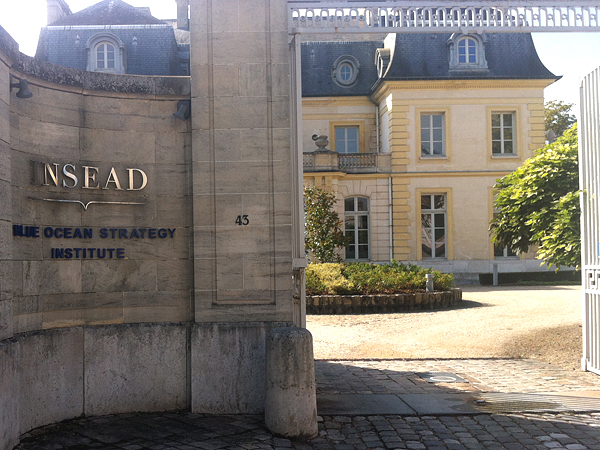
Apply to a foreign university with confidence
- Properly fulfilled documents
- Perfect motivation letter
- Support from a personal mentor
- Offers from several universities
What is business education? We will tell you about its types, requirements for admission, and how much it costs to study
Free consultation




Business education is in high demand, with over 350 thousand bachelor's degrees awarded annually in the US alone[1]. While MBA programs are commonly associated with business education, various degrees can be pursued in this field — ranging from bachelor's to PhD programs. Additionally, there are specialized programs, such as Certificate and Diploma courses, that do not result in degree awards.
This article aims to thoroughly analyze all levels of business education, including admission requirements and program costs in different countries.
Business students delve into macro- and microeconomics, finance theory, marketing, and management. They apply this knowledge to analyze real company case studies, honing their decision-making skills.
The realm of business education offers a multitude of specializations, including accounting, finance, entrepreneurship, HR, international business, marketing, public administration, and more.
Upon completing their chosen specialization, graduates of business programs can pursue diverse career paths spanning various industries — from healthcare and logistics to advertising and journalism.
| Specialization | Description | University |
|---|---|---|
| Sustainable Development | Sustainability managers minimize the company's negative impact on the environment. This direction has become popular due to increased attention to the problem of climate change and global warming. Companies hire people to develop sustainable business strategies. |
|
| Logistics and Supply Chain Management | Supply chain management professionals learn how to move goods from one location to another as cheaply as possible. They study logistics, data analysis, and strategic management. Classes on sustainable development and decreasing supply chain carbon footprints may be included in the program. | |
| Sports Management | Sports managers organize events, competitions, and marketing campaigns associated with athletes. They also work with teams and manage player transactions. Many sports managers are ex-athletes who stay in the industry. | |
| Digital Marketing | The digital transformation has moved sales and advertising channels into the digital environment, creating digital marketing and e-commerce. Specialists study strategies for promoting products on the Internet and in social media. |
|
| Business Informatics | An interdisciplinary field at the intersection of business and IT. Graduates design and develop communication systems to solve business problems, optimize processes, and create online platforms, marketplaces, and applications. |

Business education can be pursued at the bachelor's, master's, and PhD levels.
At the same time, there are two main types of business education: traditional higher education and the more prestigious field of Business Administration — including BBA (Bachelor of Business Administration), MBA (Master of Business Administration), and DBA (Doctor of Business Administration). These types have several fundamental differences.
Additionally, the business sector often offers short-term programs for additional education. These programs are particularly useful for current managers and executives who cannot take a break from work for 1-2 years to pursue full-time university studies.
There are two options available: pursuing a traditional bachelor's degree in business or management, or selecting a bachelor's degree in business administration — BBA.
Both traditional business studies and BBA programs primarily focus on theoretical knowledge, providing students with a solid understanding of business principles. This stage prepares students for further education or entry into the workforce. Students delve into macro- and microeconomics, fundamentals of management, business ethics, data analysis, team leadership, and strategic decision-making.
Specializations may lead to varying additional subjects. For instance, marketers and HR managers might study social sciences, psychology, and cognitive science. Aspiring entrepreneurs and accountants, on the other hand, need advanced courses in mathematics and statistics.
BBA (Bachelor of Business Administration) is a less common choice for a bachelor's degree in business. Although such programs emphasize theory, they also offer a more applied approach compared to traditional bachelor’s studies. The curriculum includes fewer general subjects and incorporates more business games, project work, and real company case studies.
Bachelor’s programs in business typically last four years. Graduates can find employment in junior positions, such as assistant roles, junior financial or marketing analysts, or accountants.
Admission requirements:
You may also need:
Specific requirements depend on the chosen university and program. For a full list of requirements, refer to the official website of universities.
The most popular and promising areas of business are taught at the master's level. Similar to bachelor's programs, students can choose to enter a "traditional" master's program in management and related disciplines, or opt for MBA (Master of Business Administration) programs .
The duration of programs typically lasts 1-2 years, and the curriculum varies depending on the chosen major. Some offered courses may include:
Master's programs provide in-depth knowledge of theory and methodology. They often include internships, although not as extensive as those in full-fledged MBA programs.
"Traditional" master's programs are less commonly chosen, as many students who do not plan on pursuing an academic career in business prefer to work for a few years after completing their bachelor's degree and then enroll in an MBA.
An MBA is a specialized type of master's degree in business. The main difference lies in the focus on practical experience. The curriculum includes solving real cases, participating in company internships, engaging in business games, and attending brainstorming sessions. As a result, individuals pursue an MBA not just for academic study, but also to gain experience, practical knowledge, and a professional network.
Main types of MBA programs:
Admission requirements:
Requirements vary by program. For a full list of requirements, refer to the official websites of institutions.
EMBA programs, a variation of MBA, cater to entrepreneurs, experienced senior managers, and CEOs. A minimum of 5 years of work experience is required for admission.
These programs typically last 6-12 months and often follow a part-time study format, with classes held in the evenings and on weekends.
A modular format is also common, where students attend a full-time module lasting 1-2 months before returning to work until the next one starts. Full-time programs are also available, which are usually the shortest and most intense.
Students delve into various subjects, including organizational behavior, leadership theory, effective risk management strategies, as well as project and product management.
| Characteristics | MBA | EMBA |
|---|---|---|
| Requirements |
|
|
| Exams | ||
| Duration | 1-2 years | 6-12 months |
| Average cost per year | 35,000 USD | 85,000 USD |
PhD programs in Business are tailored to equip graduates for research, academic, and leadership roles. At this level, students can choose between earning a PhD or a DBA (Doctor of Business Administration).
DBA programs train managers with strong research skills and a broad perspective. DBA alumni are prepared to assume senior management positions in large companies with complex business processes. On the other hand, PhDs in Business are more research-oriented, making them more suitable for those pursuing academic and teaching careers.
To be eligible for a Doctor of Business Administration degree, applicants should have 5-10 years of experience in senior management roles.
Students are organized into cohorts based on relevant principles. This means that individuals from different industries, such as the head of an oil and gas corporation and the CEO of an advertising agency, are unlikely to be in the same DBA stream.
DBA programs include:
PhD programs have an average duration of 3 years, though some programs may extend up to 6 years. The DBA program focuses on practical application and adopts a module format, where students gather for several days to study specific topics, exchange ideas, participate in business games, and conduct research projects. Following this, they return to their work commitments until the start of the next module.
At the end of the program, students write and defend a doctoral dissertation.
Admission requirements:

Accomplished managers conduct additional education programs for individuals seeking to expand their knowledge and explore new markets. These programs are also ideal for aspiring entrepreneurs who lack theoretical knowledge and plan to establish their own businesses.
Diploma programs typically span 1-2 years and primarily focus on specialized disciplines. While these programs may provide fewer practical skills, they aim to equip students with essential knowledge for their future work in a relatively short period. For example, a diploma program in business management may cover subjects such as strategic management, leadership theory, personnel management, and business intelligence.
Upon completing the program, graduates receive a diploma without being awarded a degree and are eligible to work in junior positions or even venture into entrepreneurship.
Mini-MBA courses are also included in this category, lasting around 6 months. Similar to full-fledged MBA programs, mini-MBA courses involve case-solving, project development, participation in business games, conferences, and more. Upon successful completion, students receive a certificate of completing the retraining course without being granted a degree.
Requirements:
Certificate programs offer the opportunity to acquire specific skills, deepen knowledge, or enhance your professional profile. For instance, digital transformation courses are suitable for individuals aiming to transition their business to the online realm.
Certificate courses are available at different levels: undergraduate and graduate / postgraduate. Undergraduate programs accept applicants directly after high school, while graduate programs typically require a bachelor's degree.
The duration of certificate programs ranges from 1 week to 3 months. Upon completion, students receive a certificate attesting to their successful course completion; however, no degree is awarded.
Requirements:
Executive Education comprises short-term courses designed for executives and company leaders, typically ranging from 1 day to a week. These courses focus on specific aspects of business or skill development. For example, HEC Paris offers short-term programs in corporate finance management, direct selling, and digital transformation.
These courses often follow a modular structure, where students meet in person once a month for several days of intensive study.
Requirements:
Some executive education programs have open enrollment, allowing free entry for individuals who meet the relevant work experience criteria. To apply, candidates simply need to fill out an application form on the program's website.
When selecting a business education program, consider the following criteria:
The following sections will explore the distinctive features of business education in various countries.
In the US, business education is offered at top universities such as Columbia, Harvard, MIT, and others. Alternatively, there are specialized institutions dedicated solely to training entrepreneurs and managers. These schools hold prestigious positions in both global and subject-specific rankings, making them highly esteemed in the field.
The top 10 best business schools in the world, as ranked by the magazine Financial Times, include 7 American business schools from renowned universities[3], known as the Magnificent 7 (M7). Admission requirements in these schools are particularly stringent compared to other institutions and countries. Aspiring students are expected to achieve a minimum GMAT score of 720 and a TOEFL score of at least 105.
In the United States, business schools primarily offer master's and MBA programs. However, there are also options for bachelor's programs, known as BBA (Bachelor of Business Administration).
| School | Cost per year | GMAT score (2022) | Financial Times ranking |
|---|---|---|---|
| Columbia Business School | 77,376 USD | 726 | 2 |
| Harvard Business School | 74,919 USD | 732 | 3 |
| MIT Sloan | 73,440 USD | 730 | 11 |
| Northwestern University Kellogg School of Management | 76,368 USD | 727 | 5 |
| Stanford University Graduate School of Business | 78,954 USD | 730 | 6 |
| University of Chicago Booth School of Business | 74,706 USD | 738 | 7 |
| University of Pennsylvania Wharton School | 83,230 USD | 733 | 1 |

European business schools are on par with their American counterparts in terms of prestige and the quality of education. Moreover, they offer distinct advantages that set them apart from New World schools:
| School | Country | Cost per year | GMAT score (2022) | Financial Times ranking |
|---|---|---|---|---|
| INSEAD | France / Singapore / UAE | 51,979 USD | 706 | 3 |
| London Business School | Great Britain | 55,087 USD | 708 | 8 |
| IESE Business School | Spain | 44,917 USD | 670 | 10 |
| HEC Paris | France | 31,188 USD | 690 | 11 |
| SDA Bocconi School of Management | Italy | 33,335 USD | 700 | 13 |

Asian countries are becoming increasingly popular choices for applicants seeking business programs. The instability of the global economy during and after the 2008 crisis raised doubts about the viability of the Western model of economics and management. As a result, 15 Asian institutions now rank among the top 100 best business schools worldwide. Among them, INSEAD's Singapore campus holds a prominent position in the top three, with China's CEIBS at 16th place and the National University of Singapore at 21st place[3].
Graduates of Asian business schools benefit from their knowledge of the region's cultural characteristics and specificities of conducting business in the East. These students gain insights from real local and international business cases and interact with individuals from diverse cultures. Such experiences contribute to shaping their vision and business strategies, considering national characteristics.
| School | Country | Cost per year | GMAT score (2022) | Financial Times ranking |
|---|---|---|---|---|
| INSEAD Singapore | Singapore | 51,499 USD | 706 | 3 |
| CEIBS | China | 33,150 USD | 684 | 16 |
| National University of Singapore Business School | Singapore | 24,580 USD | 670 | 21 |
| HKUST Business School | Hong Kong | 18,052 USD | 660 | 36 |
| NTU Business School Singapore | Singapore | 49,312 USD | 662 | 39 |

Business education in Russia appeared in the 1990s along with the market economy. Based on the American and European models. Over time, it became clear that it could not be applied to the Russian economy in transition.
Still there is a rethinking of Western models of education and attempts to apply them to Russian reality. Therefore, many Russian business schools still build the educational process according to the traditional models and it is rare to find even MBA programs in them. They are not included in the rankings, and their diploma does not have the same prestige as an American one.
| School | Programs | Cost per year |
|---|---|---|
| Higher School of Economics Graduate School of Business |
| 7,782 USD — 15,564 USD |
| Moscow State University Graduate School of Business |
| 6,465 USD — 15,564 USD |
| St. Petersburg State University Graduate School of Management |
| 5,387 USD |
| Kazan Federal University Graduate School of Business |
| 7,662 USD — 15,564 USD |
| Moscow School of Management Skolkovo |
| 23,944 USD |

Business education is a valuable investment in one's future. The average cost of programs may differ based on the country and the reputation of the school.
Fortunately, numerous business schools provide scholarships and grants to their students. Moreover, the most prestigious institutions set aside dedicated resources to support international students, as networking and multicultural exposure are vital in business education. However, these scholarships are often more readily available for MBA students. There are limited options for traditional business education scholarships. Therefore, it is advisable to explore funding opportunities directly on the university website under the Financial Aid section.
| Scholarship | Country | Eligibility | Amount | Deadline |
|---|---|---|---|---|
| Switzerland | MBA students under 28 who have already succeeded in business | up to 60,911 USD | Within 2 weeks after enrollment | |
| USA | Female students of master's and doctoral programs in business at any university in the United States | 20,000 USD / 25,000 USD | November 15th | |
| Germany | Students from Central and Eastern Europe | 25% tuition discount | Depending on the program deadline | |
| INSEAD Russian Alumni Endowed Scholarship | France, Singapore | Citizens of Russia, Ukraine, and Belarus studying at any level of education in one of the campuses at INSEAD | 22,600 USD | Depending on the program deadline |
| The Netherlands | Master's in Economics and Business | Tuition fee + 5,650 USD per year | July 24th | |
| University of St. Gallen Excellence Scholarship | Switzerland | Master's in Management, Economics, Finance, Marketing and Accounting | 24,364 USD | Depending on the program deadline |
| USA | Bachelor’s in Business Administration, Accounting, and Finance from any US university | 1000 — 10,000 USD | September 15th | |
| Trinity College Dublin’s Global Business Scholarship | Ireland | Bachelor’s in Business | 3000 — 5,650 USD | March 1st / May 1st / June 1st |
Graduates of business programs can work in almost any industry. Typically, they opt for managerial, finance, and accounting roles. However, the range of career opportunities expands significantly based on their specialization. Each stage of business education equips graduates for distinct positions.
For instance, bachelor's degree holders may start as junior financial analysts or accountants. Advancing to senior positions like manager or chief accountant often requires a master's degree or an MBA. Graduates from such programs can even aspire to become a CEO or Chief Operating Officer (COO).
Areas of employment for business graduates
60+ countries
we work with
$1,000,000 saved
by students through scholarships
6,400 offers
our students got